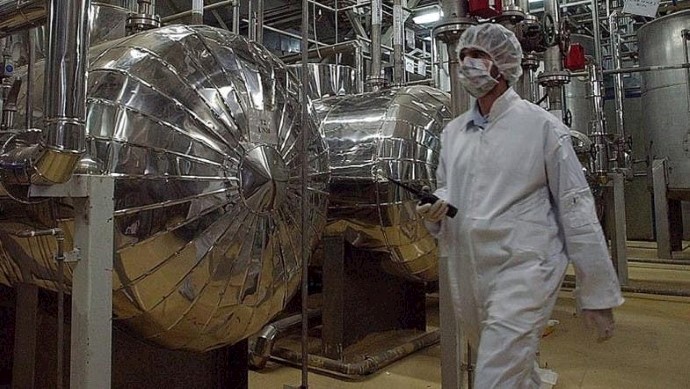Analysis by PMOI/MEK
Iran, November 7, 2019—On Tuesday, the U.S. government declared new sanctions against high profile Iranian officials. The new measure, as declared by the U.S. Department of the Treasury’s Office of Foreign Assets Control (OFAC), targets “Iran’s Armed Forces General Staff and nine individuals who are appointees of, or have acted for or on behalf of, Ali Khamenei, the Iranian regime’s unelected Supreme Leader whose office is responsible for advancing Iran’s radical agenda.”
The names include some of the closest confidants of Khamenei, including Ebrahim Raisi, a former presidential candidate and the current head of the judiciary, his son Mojtaba, and some of his top military brass.
“This action further constricts the Supreme Leader’s ability to execute his agenda of terror and oppression,” the Treasury declared.
Other news pertain that several U.S. senators are calling for more sanctions against the regime and the revoking of sanction waivers imposed by the 2015 Iran nuclear deal, officially known as the Joint Comprehensive Plan of Action (JCPOA).
While in recent years, the U.S. has set many sanctions against the Iranian regime, there are several key factors that make the latest round significant.
Attention to the 1988 massacre
In 1988, the Iranian regime committed on of the most heinous crimes of modern history. Under the orders of Ruhollah Khomeini, the founder of the mullahs’ regime, Iranian authorities executed more than 30,000 political prisoners, most of them members and supporters of the People’s Mojahedin Organization of Iran (PMOI/MEK). Until recently, the 1988 massacre, which many human rights experts and jurists classify as a genocide and crime against humanity, had received little attention from the international community.
But the recent U.S. sanctions were specifically targeted at one of the key figures of the 1988 massacre: Ebrahim Raisi. Raisi was a member of one of several “Death Commissions” who decided the fate of prisoners in minutes-long trials. The commissions sentenced all prisoners who did not disown their ties to and support for the MEK to immediate execution.
While iterating the many crimes of Raisi, the statement of the U.S. Treasury makes direct mention of the 1988 massacre. “Previously, as deputy prosecutor general of Tehran, Raisi participated in a so-called ‘death commission’ that ordered the extrajudicial executions of thousands of political prisoners in 1988,” the Treasury says.
This is the first time that the 1988 massacre becomes the direct subject of sanctions, and it shows that the efforts of the Iranian resistance and the Justice Movement for the victims of the 1988 massacre have paid off. In the past years, due to the dominance of the appeasement policy toward Iran, most states had opted to turn a blind eye on the human rights aggressions of the Iranian regime, especially the 1988 massacre.
Key figures of terrorism targeted
Also highlighted in the sanctions is the regime’s role in committing acts of terror across the globe. “These individuals are linked to a wide range of malign behaviors by the regime, including bombings of the U.S. Marine Barracks in Beirut in 1983 and the Argentine Israelite Mutual Association in 1994, as well as torture, extrajudicial killings, and repression of civilians,” the Treasury’s statement reads.
Gholam Ali Rashid, one of the Revolutionary Guards (IRGC) commanders targeted in the new round of sanctions, was directly involved in the planning and implementation of a recent missile and drone attack against oil installations in Saudi Arabia.
According to information obtained by the MEK and exposed by the National Council of Resistance of Iran (NCRI), Rashid was present in a Supreme National Security Council (SNSC) meeting in which Khamenei ordered the attack on the Saudi oil giant.
Rashid is also the commander of the Khatam al-Anbia garrison, the most important military headquarters of the IRGC and the core of its economic powerhouse.
Iran’s meddling in Iraq
In a briefing session after declaring the new sanctions, U.S. authorities also referred to the Iranian regime’s destructive interference in the affairs of the countries of the region, including Iraq, Lebanon and Yemen. They raised concern about the regime’s continued meddling in these countries.
In the past weeks, massive protests in Iraq and Lebanon have been calling for the ouster of the Iranian regime from their countries. For decades, the Iranian regime has used its terrorist agents and groups to carve up a niche for itself in these countries and gradually occupy them through its proxies.
In response recent protests in Iraq and Lebanon, the regime ordered its affiliates to attack and slaughter the protesters to quell the demonstrations. But so far, Tehran’s efforts have had a reverse effect and resulted in more outrage by protesters. The cries of the people of Iraq, who were saying “Iran must leave, Baghdad must stay free,” are now resonating across the world.
There is now no doubt for anyone inside or outside of these countries that the regime of Iran has no productive role or intentions in their countries.
And as the new sanctions show, the world is slowly but surely starting to catch on that there is nothing about this regime that is acceptable.





